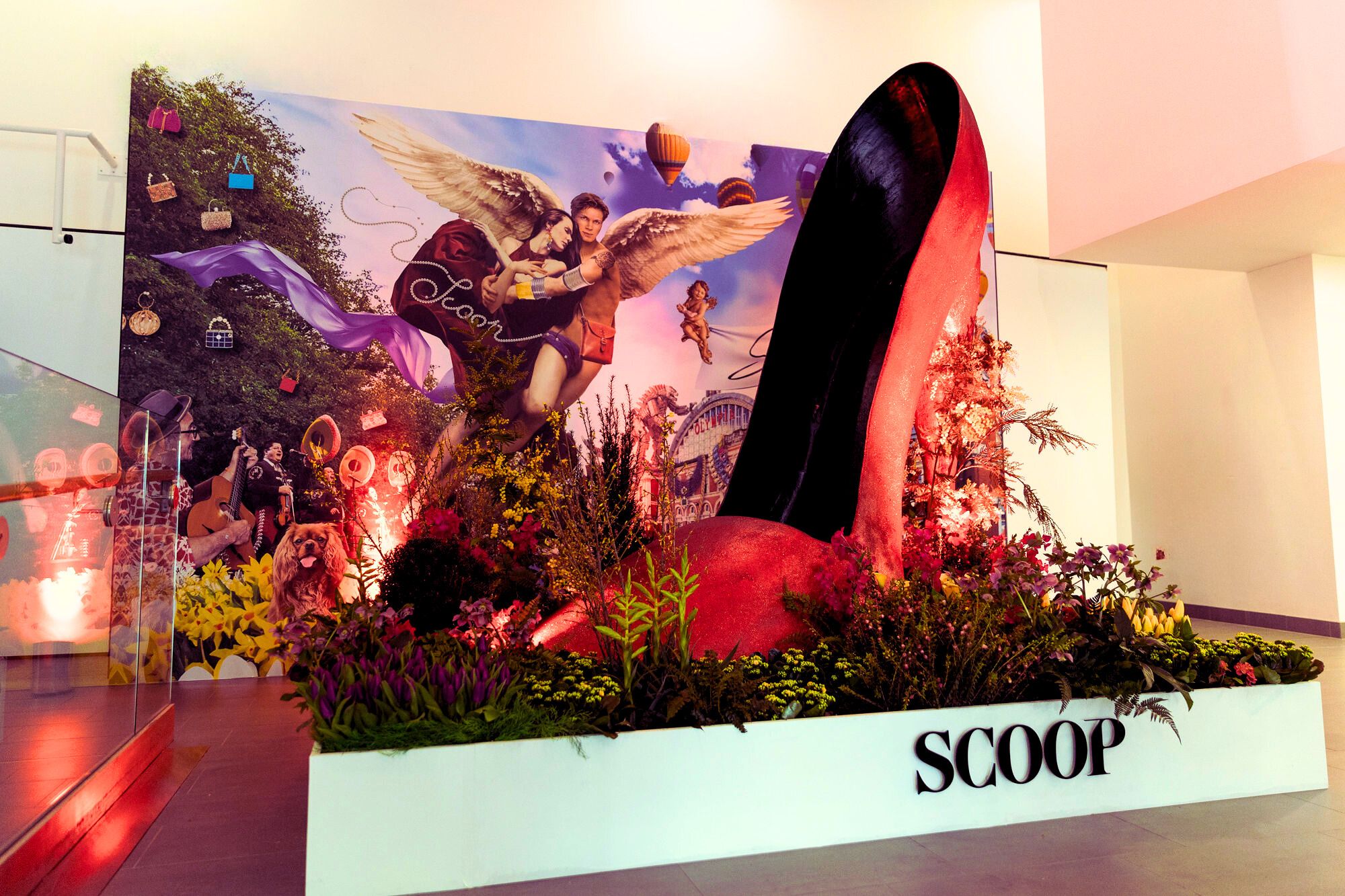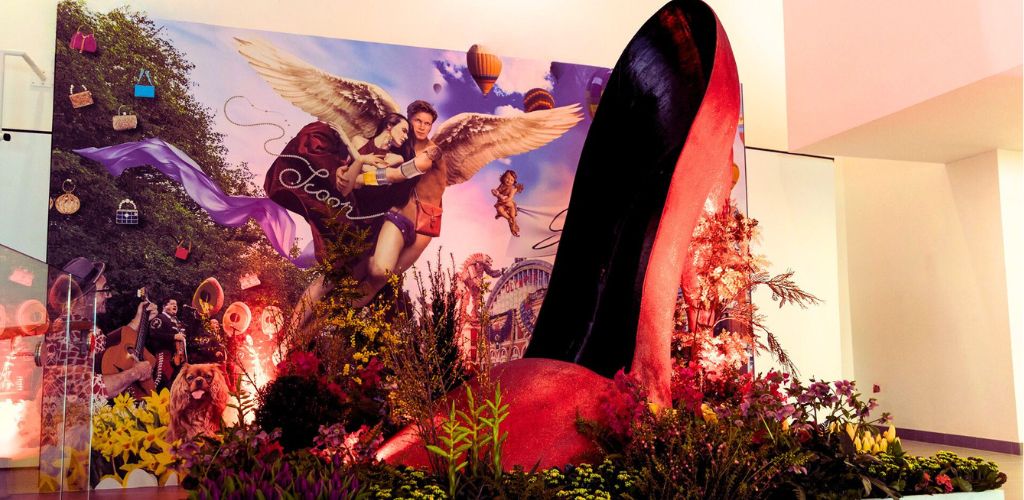
“We are not a trade show,” Scoop International director Karen Radley noted on the biannual London event at its latest February edition. “I see Scoop as a big showroom. I’ve attended trade shows as a designer myself. This isn’t like any trade show I’ve ever been to. That’s why I’ve created it. The star of the show, and it’s absolutely nothing to do with me, are the collections.”
It is not just in this respect that Scoop really stands out. On entering, Radley’s unique approach is already evident. Walking up to Olympia London West, guests are greeted by sculptures of Alice in Wonderland’s The White Rabbit, before entering the building to the tune of ‘We’re Painting the Roses Red’. To top it all off, a large ruby slipper stands among an array of colourful flowers, next to which a handful of eccentrically dressed staff enthusiastically welcome you – very much a one-off experience for those of us familiar with attending such events.
The theatrics are all a reflection of Radley’s overarching theme of the season, ‘A Return to Wonderment’, an amalgamation of quintessential Britishness and humour that instead of relating to the current times we are in, offers attendees and exhibitors alike a sense of much needed escapism. As such, the theme continues onto the showroom floor, through art deco furniture and opulent gold chandeliers that adorn each aisle.
Unlike Scoop’s much larger peers, there is a clear curation in the 200 exhibitors on offer, an intentional choice by Radley, who said: “The word ‘fashion’ is changing. I have to adapt to what the actual market wants and I think the show reflects that. Everybody would love to do first-line premium collections, but that’s not what the market’s about. At Scoop, I try to have what the retailers want.”
Why physical retail still matters
This smaller format was new to Dutch brand Yaya, which already has a presence in 31 countries, and places much of its importance on making its customers happy over operational goals and financial missions. Its first-time attendance at Scoop marks the brand’s overall return to the trade show scene after an intentional departure that came during the pandemic, when the company instead opted to spend its money on other avenues of customer service – particularly in the realm of physical retail.
In fact, for Yaya, despite all its turbulence, physical retail remains its most important sector, and the only one they were targeting at Scoop. “We really believe in physical stores because we’re not just selling a product, we’re telling a story,” the brand’s international sales manager, Tamara Gitgel, said. “If you make this decision, you have to be strong. We see websites as unfair competition for existing stores. So when we start with a client, we always tell them to sell our story.” And while Gitgel had at first been sceptical about attending Scoop, she said she had been surprised by the turnout, noting that new customers from the UK and Ireland’s mid-high segment, one Yaya is rooted in, had been connecting with the brand, alongside existing ones.
In fact, such sentiments on the retail market were also mirrored by Radley, who said that while there had previously been a boom in online, it has seemed to have plateaued. “We are seeing openings of brick and mortar stores again. People are going back into department stores, especially in London. And we’re seeing the rise of the independents.”
Other high street devotees were Blank and its little sister Conditions Apply, the former being a previous Pure London attendee before swapping the show out for Scoop, of which the latter is a regular. The move was triggered by a shift in clientele at Pure that no longer spoke to the brands’ end consumer, leading to the official switch to Scoop, where they had been “welcomed with open arms”. So much so that the brand even dressed employees of the fair for this season in a selection of its silky kimonos. It is this physicality that is of steadfast importance to the UK-based, India-produced labels, for which bricks and mortar is the most popular mode of selling.
While there is a clear preference here, the uncertainty towards the high street has not gone unnoticed. Zoe Baldock, sales manager for the brands, said: “There’s a lot more safe purchasing, whether retailers are going back to those things that they know, or whether they're just a bit more kind of conservative in terms of their constitutions. We have found that when people have gone back to those things that they love they can still buy those things with confidence which is great for us because we know that there's something that works for them.”
Brexit remains hot topic
Whereas the shift towards a more positive perspective of physical retail is obviously a welcomed one, bringing forth a refreshing sense of relief after recent years of doubt over the state of the UK high street and its subsequent closures, the state of the UK economy was still an underlying concern for many of the brands exhibiting. In regards to this, an agent of Diega, a Parisian label on the more premium end of the spectrum, said that unlike other international trade shows, England had struggled to elevate its fashion offering largely due to the financial concerns experienced by smaller retailers in the region.
“I think the event is lovely and it’s important. It’s exactly what London needed. It’s a good insight into being able to view collections and see what other people are doing,” she said of the trade show, before noting that, akin to the observations of Baldock, there was also a sense of timidity from buyers. “If you’re sitting in a shop up north, for example, you know your customer and their limitations. It’s all about survival at the moment. This trade show is great for smaller boutiques that maybe can’t afford to come to London for days and days of appointments. If there was one word to sum it up, it would be ‘realism’. If we want a high street, everybody has to be realistic.”
In contrast to the UK, Diega’s agent noted that the French government was doing much better in supporting their brands and their pursuits overseas through various funding. She continued: “The French government has been amazing because they’re backing up their fashion and contributing towards showing at all the exhibitions. The French Federation of Fashion has supported a lot of French brands so it means that they can access different markets. The move really is to get more recognition. Everybody’s got to find their little gap in the market.”
It also becomes clear that, next to the affinity for physical retail, one of the central challenges continues to be Brexit, the process of which is now coming into its fourth year. It is something that Diega’s representative said has defined conversations with brands and buyers, many of which start discussions with the question: are there duties included?
The obstacles Brexit presents are even a lot for brands that are well versed in the UK market, such as Yaya, which has been operating in the region for 15 years. Despite this, Gitgel said: “[Brexit] has been really complicated to be honest. We are always looking into VAT, who is the best to ship with. But we stick through it. We took some of the pain from the VAT that wasn’t paid by the customers, we try to find a way where we can be helpful to the UK customers.”
Footfall returns to pre-covid levels
Another brand that expressed concern towards the current unfoldings of Brexit was Danish knitwear label Americandreams, however this had not deterred those behind the brand from continuing to build up its presence in the UK. While the label is already familiar with Scoop, having attended as part of an agency before, it was the first time it had attended on an individual basis, a move it made as part of its efforts to secure a firmer foothold in the UK and Ireland. And as part of its expansion into overseas markets, those behind the brand put an emphasis on who they select as partners, something Scoop was able to deliver on.
CEO and founder of the label, Cecilie Villadsen, said: “At Scoop, we have been really busy. In the UK we want to build ourselves in the same way as we have in the US, which means we are looking for solid stores that can look after our brand the way we do. There has been a mix of physical and e-commerce retailers, many nice stores that are also really good online. It’s mostly people from the UK. Last time it was very international, but this time it’s much more local.”
Footfall came in at pre-covid levels, however while the influx of visitors is always a welcome sight, Radley’s stress on curation also extends into who attends. “We saw the increase [in footfall] already in July, but this season really is now pre-covid, I’m delighted to say. We are very careful. We could have double the footfall, but it’s heavily edited. We stop people that we feel are not right for the Scoop audience, and the designers have really appreciated that.” As such, buyers from the likes of Liberty London, Fenwicks, Harvey Nichols and Stanwells were among those attending, alongside international department stores like Galeries Lafayette, Le Printemps and Le Bon Marche.
The show is still primarily designed for UK and Irish retailers, yet its international reach is growing, now standing at about 25 percent of footfall. An uptick in interest has particularly been seen from exhibitors and buyers from North and South America, regions Radley said she is hoping to establish stronger connections with. When asked what to expect for next edition, Radley, who is notoriously known for keeping any details of Scoop under wraps until days before her events, said: “There’s only two of us that ever know the theme. I do want the show to get bigger and I’ve got lots of ideas for next season which are quite exciting. Watch this space.”
Thank you to Fashion United for joining us this season.
Brexit, budgets and a high street revival: Down the rabbit hole at Scoop International (fashionunited.com)

